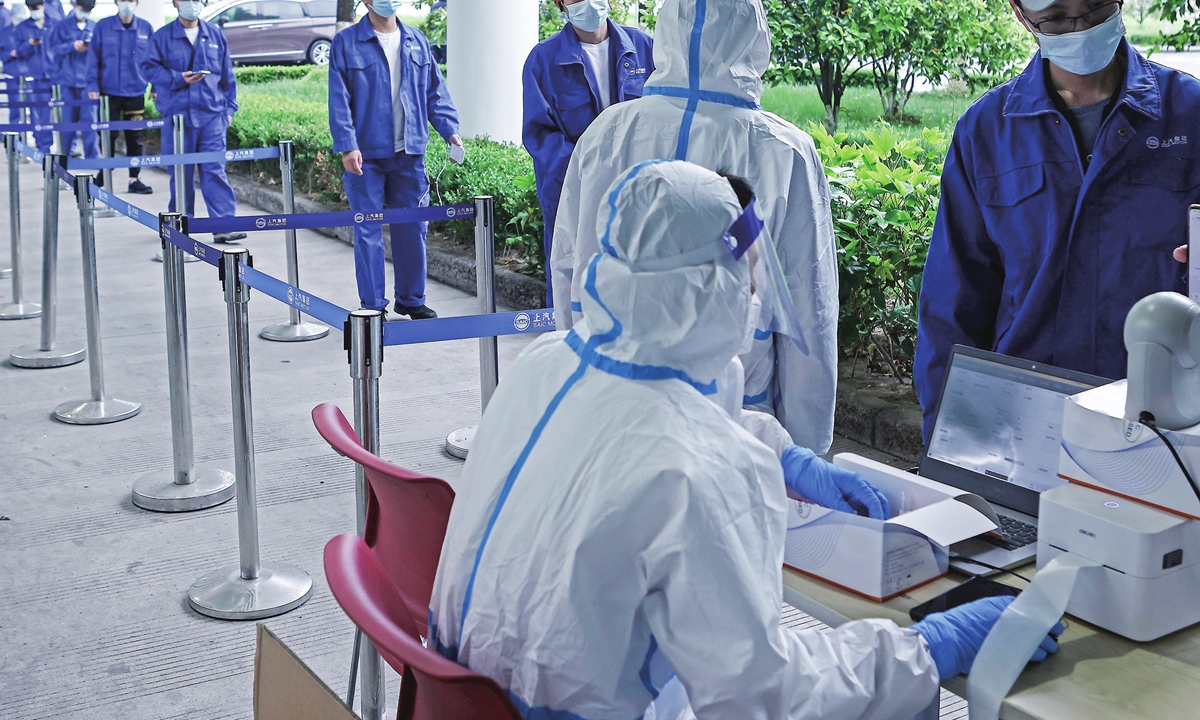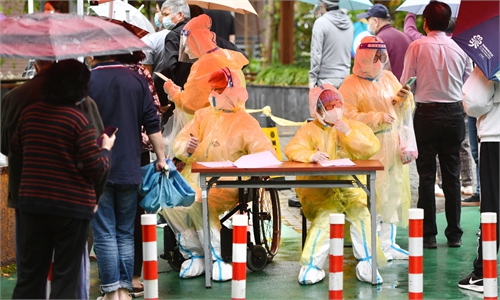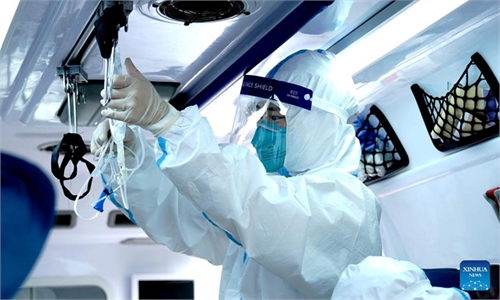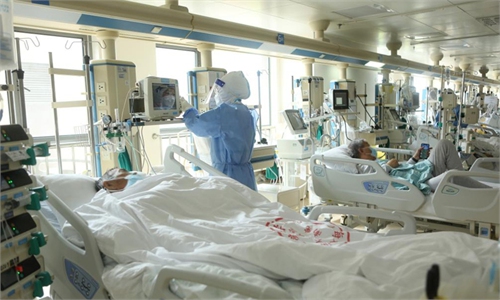Shanghai sees sharpest case drop since Omicron epidemic, yet far from time to let guard down: officials

Staff at SAIC Motor's Lingang plant in Shanghai line up to register before nucleic acid testing on April 23, 2022. More than 4,000 employees face closed production. A lot of key firms have resumed work and production in the city. Photo: cnsphoto
Positive signs flicker in Shanghai with the sharpest case drop recorded since the latest outbreak, and only a small proportion of cases found outside the quarantined areas. Yet municipal officials, believing it is far from time to let their guard down, kicked off another round of mass testing and doubled down on restrictions on leaving Shanghai, to prevent the infection from spilling over.
New infections dropped 13 percent in Shanghai to 16,980 on Monday, while confirmed cases declined by about one-third to 1,661 compared with Sunday and new fatalities reached 52, according to data released on Tuesday. This, according to city's officials, marks the sharpest drop of case numbers since the outbreak. Moreover, 90 percent of the new cases were found within the quarantined areas.
The city, with a population of 25 million, has recorded total infections exceeding 500,000 since the tail end of February, officials said.
Speaking at a Tuesday conference, Zhao Dandan, a deputy director of the Shanghai Municipal Health Commission, said that the curve of the outbreak has been flattened and is dropping, yet it is far from time for the city to let its guard down. Zhao said that Shanghai is strictly sticking to the policy of "not leaving Shanghai unless unnecessary" to prevent the infection from spilling over to other places.
The city kicked off another round of mass testing on Tuesday. Some districts set up tents under the eaves of shopping malls to evade the drizzling rain. Several residents told the Global Times that the bad weather has partly affected the government's plan. One Shanghai resident Li Cuihua told the Global Times that her community held off the test until the rain stopped.
This mass testing is likely to provide data for Shanghai to further relax its restrictive policies in certain areas after the Labor Day holidays in early May, as the city's lockdown has dragged into the fourth week, a Beijing-based immunologist, who requested anonymity, told the Global Times.
According to Zhao, Shanghai has been screening some 10 million people on a daily basis recently. Support from other provinces helped Shanghai complete this task. Medical workers in neighboring provinces such as Jiangsu, Zhejiang and Anhui have made 200,000 one-day trips to Shanghai to help testing, and a total of 25,000 medical workers from other provinces are also in Shanghai testing the city's residents.
Shanghai's strict measures to expand testing help stem viral infections within communities, and they go along with the city's goal of stamping out infection within all communities by early May, Chen Xi, an associate professor of public health at Yale University, told the Global Times. He also pointed out the hidden danger is to avoid infections during mass testing.
Epidemiologists said that the treatment of severe cases will be the major focus of Shanghai's upcoming COVID-19 battle, as the city has seen increasing numbers of severe cases and deaths in recent days.
Zhao said at the conference that 52 deaths were reported in Shanghai for Monday, which took the city's death tally during this wave to 190. So far, 86.32 percent of the deceased were aged above 70.
A 33-year-old male patient on Monday died of sudden cardiac arrest in Shanghai, and he had received two doses of COVID-19 vaccine, according to Zhao.
Immunity varies greatly from person to person, the anonymous immunologist said, noting that even with the same vaccine, the amount of protection produced also varies greatly.
All residents including young people, or those with or without underlying diseases, should also ensure adequate nutrition and good mental health to maintain a healthy immune system and improve resistance to COVID-19 infection.
In battling COVID-19, Shanghai should also focus on guaranteeing people's daily lives, social stability and treatment for other diseases, Zeng Guang, former chief epidemiologist of China's Centers for Disease Control and Prevention, warned.
Material supply has been a hot issue since Shanghai entered the latest lockdown, as many residents complained of shortages of food and other materials. Some Shanghai residents told the Global Times this has become less of a problem as the government doubled down on efforts to ensure ample supplies and smooth deliveries.
"More and more platforms have increased their supplies, and we can always get what we want via group-buying in our communities. It's probably not as convenient as the pre-outbreak era, but it's improving," Shanghai resident Catherine You told the Global Times.
Ensuring the smooth delivery of quality materials is very important as problems in this sector will sway the public's determination and cooperation with the government, thus delaying the government's goal of eliminating viral infections within communities, said Chen.



